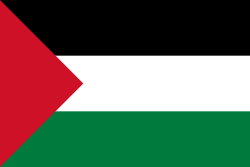
Back حزب البعث (الفصيل العراقي) Arabic حزب البعث (فصيل العراق) ARZ حیزبی بەعس (فراکسیۆنی عێراق) CKB Κόμμα Μπάαθ (Ιρακινή κυρίαρχη παράταξη) Greek حزب بعث (جناح تحت رهبری عراق) Persian Parti Baas (faction dominée par les Irakiens) French Partai Ba'ath (faksi dominasi Irak) ID Ba'ath-partij (Iraaks-geleide factie) Dutch د عراق بعث ګوند Pashto/Pushto Partido Baath (Iraque) Portuguese
Arab Socialist Ba'ath Party Arabic: حزب البعث العربي الاشتراكي | |
|---|---|
 | |
| General Secretary | Salah Al-Mukhtar |
| Founded | 25 February 1966 |
| Banned | In Iraq: 16 May 2003 (still active in other states) |
| Split from | Ba'ath Party (unitary) |
| Headquarters | Baghdad, Iraq (1966–2003) |
| Armed wing | Army of the Men of the Naqshbandi Order (2006–present) |
| Ideology | Ba'athism Saddamism (from 1979) Islamism[1][2][3] (from 1993) |
| Political position | Right-wing[n 1] |
| Colors | Black, red, white and green (Pan-Arab colors) |
| Party flag | |
 | |
The Arab Socialist Ba'ath Party (spelled "Ba'th" or "Baath", "resurrection" or "renaissance"; Arabic: حزب البعث العربي الاشتراكي Ḥizb al-Ba‘th al-‘Arabī al-Ishtirākī), also referred to as the pro-Iraqi Ba'ath movement, is a Ba'athist political party which was headquartered in Baghdad, Iraq, until 2003. It is one of two parties (with identical names) which emerged from the 1966 split of the original Ba'ath Party.
In 1966, the original Ba'ath Party was split in half; one half was led by the Damascus leadership of the Ba'ath Party which established a party in Syria and the other half with its leadership in Baghdad. The two Ba'ath parties retained the same name and maintained parallel structures in the Arab world, but relations became so antagonistic that Syria supported Iran against Iraq during the bloody Iran–Iraq War; it also joined the U.S.-led coalition against Iraq in the Gulf War. The Ba'athists seized power in Iraq for the first time in 1963, but were deposed several months later. The party's regional organisation governed Iraq between 1968 and 2003, for many years under the leadership of Saddam Hussein. The Arab Socialist Ba'ath Party – Iraq Region was banned in 2003 by the Coalition Provisional Authority following the invasion of Iraq by the US and its allies. Other branches of the party have continued to operate.
- ^ Baram, Amatzia (October 2011). "From Militant Secularism to Islamism" (PDF). Wilson Center. Retrieved 23 February 2025.
- ^ "The Army of the Men of the Naqshbandi Order". Kurdistan Tribune. 29 January 2024. Retrieved 23 February 2025.
- ^ "Islamist militants strengthen grip on Iraq's Falluja". Al Arabiya. 20 May 2020 [January 18, 2014]. Retrieved 23 February 2025.
- ^ Sassoon 2012, p. 30, The rift between the Ba'th parties in Syria and Iraq widened. In February 1966, a military coup by the party's left wing in Syria forced 'Aflaq and the Syrian leadership to seek refuge in Iraq. From that point on, despite short periods of rapprochement, the chasm between the so-called left-wing in Syria and the right-wing supported by al-Bakr and Saddam Hussein was never bridged..
- ^
- Alla, Malumud Ata (1974). Arab Struggle for Economic Independence. Progress. p. 62. Archived from the original on 7 October 2024. Retrieved 1 October 2024.
This struggle sharpened after the Right-wing Baathists seized power in Iraq in 1963 and instituted a reign of terror against the Communists and other progressive forces, which considerably weakened the influence of the Baath Party in all the Arab countries.
- Coughlin, Con (2005). Saddam: His Rise and Fall. Harper Perennial. p. 41. ISBN 0-06-050543-5.
- A. I. Dawisha, (1976). Egypt in the Arab World: The Elements of Foreign Policy. American Political Science Review. Cambridge University Press. p. 56. ISBN 978-0333191958. "Then in July 1968, a coup occurred in Baghdad which brought in the right-wing faction of the Baath party."
- Blamires, Cyprian; Jackson, Paul (2006). World Fascism: A Historical Encyclopedia, Volume 1. ABC-CLIO. p. 82-84. ISBN 978-1576079409.
- Alan John Day, ed. (1983). Political Dissent An International Guide to Dissident, Extra-parliamentary, Guerrilla, and Illegal Political Movements. Gale Research Company. p. 223. ISBN 9780810320505.
- Alla, Malumud Ata (1974). Arab Struggle for Economic Independence. Progress. p. 62. Archived from the original on 7 October 2024. Retrieved 1 October 2024.
Cite error: There are <ref group=n> tags on this page, but the references will not show without a {{reflist|group=n}} template (see the help page).